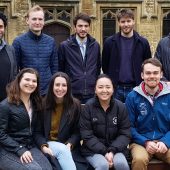
Dr Taha Yasseri
Former Senior Research Fellow
Project role: European Commission
Taha Yasseri analyses large-scale transactional data to understand human dynamics, collective behaviour, collective intelligence and machine intelligence.

Increasingly, activities in work and social life are conducted within human-machine networks, where collaboration involves many different actors; governments and organisations, individuals and machines such as smart devices, sensors and computing infrastructure. The targets of these networks can be for policy making, commercial innovation, education, improved quality of life, and information exchange or resource organisation. As networks become more complex and include more connections between humans and machines, so the characteristics of those networks become important in determining the effectiveness and successful evolution of the collaborations which they support. Emerging challenges are: understanding the processes necessary for developing and maintaining human-machine networks such that they are able to deliver their intended outcomes; and applying this knowledge to support emerging networks in public, commercial and civil domains to more readily achieve key European goals. In HUMANE we will develop a typology of human-machine networks focused on characteristics of relationships between networked humans and machines such as trust, motivation, reputation, responsibility, privacy and security. We will consider health indicators for networks and create prototype tools that can be exploited through a community of stakeholders to create and enrich human-machine networks. We will propose a roadmap and methodology for the evolution of such networks, appropriate to the needs of ICT developers, building on in-depth case studies taken from R&I projects relevant to the societal DAE pillars to form a supporting framework for future thinking and ICT policy-making in Europe. The project partners in HUMANE have wide and complementary experience in social sciences and ICT R&I, essential for bridging the technological, societal, industrial and human-centric components necessary to achieve improved understanding of emerging hyper-connected human-machine networks.
This project is funded by the European Commission Horizon 2020 – Research and Innovation Framework Programme.

Former Senior Research Fellow
Project role: European Commission
Taha Yasseri analyses large-scale transactional data to understand human dynamics, collective behaviour, collective intelligence and machine intelligence.

Former
Project role: Researcher
Milena Tsvetkova is a sociologist who uses computational and online technologies to study fundamental social phenomena such as cooperation, contagion, and inequality.

Former
Project role: Researcher
Ruth García Gavilanes is a Postdoctoral researcher and data scientist at the OII.

Senior Fellow
Eric T. Meyer is a Senior Fellow of the Oxford Internet Institute. His research looks at the changing nature of knowledge creation in science, medicine, social science, arts, and humanities as technology is embedded in everyday practices.

Former MSc Student
Project role: Research Assistant
Bill holds a BS in Biochemistry (University of Wisconsin-Madison, 2016) where he researched developmental biology. He is interested how non textual communication shapes the scientific story.

With Dr Taha Yasseri
Our personal and social daily activities produce an unprecedented amount of data: Taha Yasseri is interested in developing mechanistic models to explain not just causality but also quantitative prediction.

The Guardian, 12 October 2016
Researchers at the Oxford Internet Institute examine Wikipedia articles about some 1,500 crashes around the world.

New Scientist, 21 September 2016
Wikipedia editors use bots to help them keep on top of changes that users have made to the online encyclopedia. But sometimes two editors will task different bots with making incompatible edits.

TechCrunch, 21 September 2016
Bots are a useful tool on Wikipedia: they identify and undo vandalism, add links and perform other tedious tasks. But even these automated helpers come into conflict, sometimes for years.

The Register, 21 September 2016
A group of researchers from Oxford University and the Alan Turing Institute in London say once Wikipedia bots get into a disagreement, they spend years reverting each others' edits.